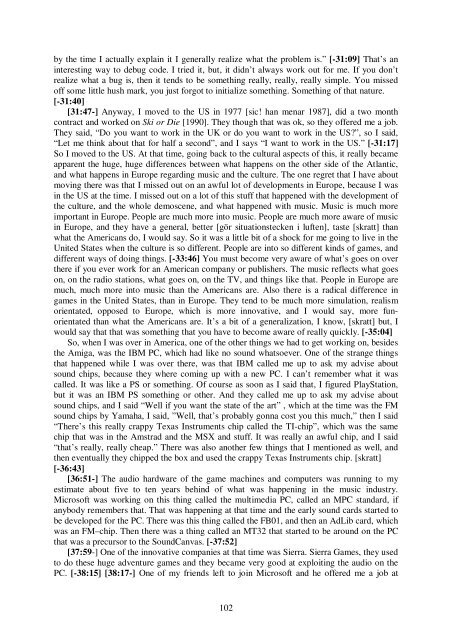Musikaliska uttryck och funktioner i interaktiva v rldar - C64.com
Musikaliska uttryck och funktioner i interaktiva v rldar - C64.com
Musikaliska uttryck och funktioner i interaktiva v rldar - C64.com
You also want an ePaper? Increase the reach of your titles
YUMPU automatically turns print PDFs into web optimized ePapers that Google loves.
y the time I actually explain it I generally realize what the problem is.” [-31:09] That’s an<br />
interesting way to debug code. I tried it, but, it didn’t always work out for me. If you don’t<br />
realize what a bug is, then it tends to be something really, really, really simple. You missed<br />
off some little hush mark, you just forgot to initialize something. Something of that nature.<br />
[-31:40]<br />
[31:47-] Anyway, I moved to the US in 1977 [sic! han menar 1987], did a two month<br />
contract and worked on Ski or Die [1990]. They though that was ok, so they offered me a job.<br />
They said, “Do you want to work in the UK or do you want to work in the US?”, so I said,<br />
“Let me think about that for half a second”, and I says “I want to work in the US.” [-31:17]<br />
So I moved to the US. At that time, going back to the cultural aspects of this, it really became<br />
apparent the huge, huge differences between what happens on the other side of the Atlantic,<br />
and what happens in Europe regarding music and the culture. The one regret that I have about<br />
moving there was that I missed out on an awful lot of developments in Europe, because I was<br />
in the US at the time. I missed out on a lot of this stuff that happened with the development of<br />
the culture, and the whole demoscene, and what happened with music. Music is much more<br />
important in Europe. People are much more into music. People are much more aware of music<br />
in Europe, and they have a general, better [gör situationstecken i luften], taste [skratt] than<br />
what the Americans do, I would say. So it was a little bit of a shock for me going to live in the<br />
United States when the culture is so different. People are into so different kinds of games, and<br />
different ways of doing things. [-33:46] You must become very aware of what’s goes on over<br />
there if you ever work for an American company or publishers. The music reflects what goes<br />
on, on the radio stations, what goes on, on the TV, and things like that. People in Europe are<br />
much, much more into music than the Americans are. Also there is a radical difference in<br />
games in the United States, than in Europe. They tend to be much more simulation, realism<br />
orientated, opposed to Europe, which is more innovative, and I would say, more funorientated<br />
than what the Americans are. It’s a bit of a generalization, I know, [skratt] but, I<br />
would say that that was something that you have to become aware of really quickly. [-35:04]<br />
So, when I was over in America, one of the other things we had to get working on, besides<br />
the Amiga, was the IBM PC, which had like no sound whatsoever. One of the strange things<br />
that happened while I was over there, was that IBM called me up to ask my advise about<br />
sound chips, because they where coming up with a new PC. I can’t remember what it was<br />
called. It was like a PS or something. Of course as soon as I said that, I figured PlayStation,<br />
but it was an IBM PS something or other. And they called me up to ask my advise about<br />
sound chips, and I said “Well if you want the state of the art” , which at the time was the FM<br />
sound chips by Yamaha, I said, ”Well, that’s probably gonna cost you this much,” then I said<br />
“There’s this really crappy Texas Instruments chip called the TI-chip”, which was the same<br />
chip that was in the Amstrad and the MSX and stuff. It was really an awful chip, and I said<br />
“that’s really, really cheap.” There was also another few things that I mentioned as well, and<br />
then eventually they chipped the box and used the crappy Texas Instruments chip. [skratt]<br />
[-36:43]<br />
[36:51-] The audio hardware of the game machines and computers was running to my<br />
estimate about five to ten years behind of what was happening in the music industry.<br />
Microsoft was working on this thing called the multimedia PC, called an MPC standard, if<br />
anybody remembers that. That was happening at that time and the early sound cards started to<br />
be developed for the PC. There was this thing called the FB01, and then an AdLib card, which<br />
was an FM–chip. Then there was a thing called an MT32 that started to be around on the PC<br />
that was a precursor to the SoundCanvas. [-37:52]<br />
[37:59-] One of the innovative companies at that time was Sierra. Sierra Games, they used<br />
to do these huge adventure games and they became very good at exploiting the audio on the<br />
PC. [-38:15] [38:17-] One of my friends left to join Microsoft and he offered me a job at<br />
102


